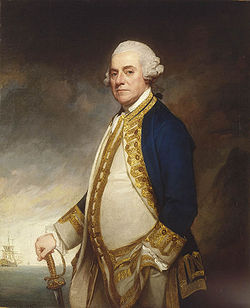- Charles Hardy
-
For other people named Charles Hardy, see Charles Hardy (disambiguation).
Sir Charles Hardy 
Hardy, painted by George Romney in 1780Born ca. 1714 Died 18 May 1780 Allegiance United Kingdom of
Great Britain and IrelandService/branch Royal Navy Rank Admiral of the Fleet Commands held Channel Fleet Admiral of the Fleet Sir Charles Hardy (ca. 1714 – 18 May 1780) was a Royal Navy officer and colonial governor of New York.
Contents
Early career
Born at Portsmouth, the son of a vice admiral, Charles Hardy joined the Royal Navy as a volunteer in 1731.[1]
He became a captain in the Royal Navy on 10 August 1741,[1] around the age of 27. He was appointed governor and commander-in-chief of the British colony of Newfoundland in 1744.[1] There is no evidence that he ever visited the colony of Newfoundland. The next year he commanded Gibraltar to the newly captured fortress of Louisbourg.[1]
He was knighted in 1755 and served as British Administrative Governor of the Colony of New York from 1755 to 1757[1] (replaced by James Delancey). During his term he was made Rear Admiral of the Blue.
Seven Years War
Main article: Great Britain in the Seven Years WarIn 1757, under the command of Vice Admiral Francis Holburne, Hardy escorted Lord Loudoun and his army from New York to Halifax intending to attack the French fortress of Louisbourg, but the attack was cancelled. The next year, he was second in command under Admiral Edward Boscawen at the Siege of Louisbourg.[1]
That autumn, he and James Wolfe attacked French posts around the mouth of the St. Lawrence River and destroyed all of the French fishing stations along the northern shores of what is now New Brunswick and along the Gaspé peninsula. He also participated in Hawke's victory at the Battle of Quiberon Bay in 1759.[1] He became Member of Parliament for Rochester in 1764.[2]
Hardy served as governor of Greenwich Hospital from 1771 to 1780. In 1778, he was made Admiral of the White. In 1779 he became Commander-in-Chief of the Channel Fleet remaining in that post until his death in May 1780.[1]
Personal life
In 1749 he married Mary Tate and in 1759, following his first wife's death, he married Catharine Stanyan.[1] The couple had three sons and two daughters. Sir Charles Hardy died at Spithead. He bequeathed £3000 to each of the sons and £4000 to each daughter,[1] as well as leaving his estate at Rawlins, Oxfordshire, to his eldest son Temple Hardy. By Catharine's death in 1801, only Temple survived of the three sons. Hardy's brother, Josiah, was a merchant and the Governor of New Jersey from 1761-63.
See also
- Governors of Newfoundland
- List of people of Newfoundland and Labrador
References
External links
Political offices Preceded by
Thomas SmithCommodore Governor of Newfoundland
1744–1744Succeeded by
Richard EdwardsPreceded by
James DeLanceyColonial Governor of New York
1755–1758Succeeded by
James DeLancey Lieutenant-Governors & Governors of Newfoundland
Lieutenant-Governors & Governors of Newfoundland 
Proprietary Governors (1610–1660) French Gouverneurs (1655–1713) de Kéréon · Gargot · Du Perron · Bellot · Palme · Pioppe · Parat · Louis de Pastour de Costebelle · de Brouillan · de Monic · de Subercase · Philippe Pastour de Costebelle
Commodore-Governors (1729–1825) Osborn · Clinton · Falkingham · Muskerry · Lee · Vanbrugh · Medley · Smith · Byng · Smith · Hardy · Edwards · Douglas · Watson · Rodney · Drake · Bonfoy · Dorrill · Edwards · Webb · Graves · Palliser · Byron · Shuldham · Duff · Montagu · Edwards · Campbell · Elliot · Milbanke · King · Wallace · Waldegrave · Pole · Gambier · Gower · Holloway · Duckworth · Keats · Pickmore · Hamilton
Civil Governors (1825–1855) Colonial Governors (1855–1907) Dominion Governors (1907–1934) Commission Governors (1934–1949) Lieutenant Governors (1949–present) Categories:- British knights
- Newfoundland colonial leaders
- Colonial governors of New York
- Royal Navy admirals
- Lords of the Admiralty
- People from Portsmouth
- 1710s births
- 1780 deaths
- Members of the Parliament of Great Britain for English constituencies
Wikimedia Foundation. 2010.
